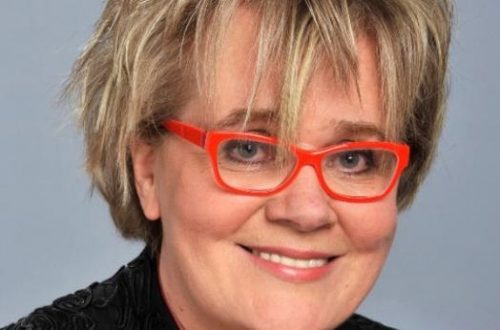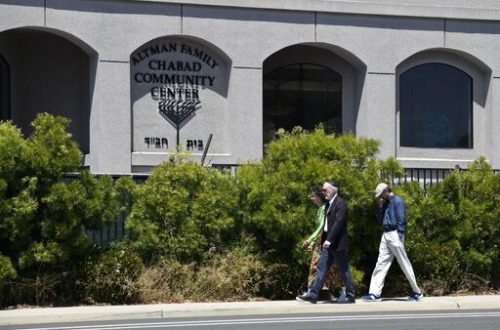President Obama has nominated Solicitor General Elena Kagan to the Supreme Court to replace retiring Justice John Paul Stevens.
If confirmed by the Senate, Kagan will become the third Jew on the court, along with six Catholics. For the first time in history, the court would be without a Protestant justice.
This disturbs some people. One of them is paleocon Pat Buchanan who, unsurprisingly, focuses on the Jewish angle:
“If Kagan is confirmed, Jews, who represent less than 2 percent of the U.S. population, will have 33 percent of the Supreme Court seats,” Buchanan wrote. “Is this the Democrats’ idea of diversity?”
Buchanan was responding to a Washington Post story about black leaders expressing disappointment over solicitor general Elena Kagan’s record at Harvard Law, where the faculty members she hired were mostly white.
“But while leaders in the black community may be upset, the folks who look more like the real targets of liberal bias are white Protestants and Catholics, who still constitute well over half of the U.S. population,” he wrote. “Not in living memory has a Democratic president nominated an Irish, Italian or Polish Catholic, though these ethnic communities once gave the party its greatest victories in the cities and states of the North.”
Kathleen Parker, a former writer for The National Review and now a columnist for The Washington Post, has seemed to me a fairly sensible and thoughtful conservative. Among other things, she was bold enough to write after Sarah Palin’s 2008 nomination for vice president:
Palin’s recent interviews with Charles Gibson, Sean Hannity, and now Katie Couric have all revealed an attractive, earnest, confident candidate. Who Is Clearly Out Of Her League.
So in a way, what she wrote about the Kagan nomination is even more troubling than what Buchanan did. Buchanan, after all, has for decades been skeptical about the loyalties of American Jews and suspicious of their power and influence.
Parker wrote in her Post column about Kagan:
President Obama has made clear his desire to nominate justices who are in touch with “ordinary Americans.” He specifically mentioned “empathy” in choosing Sotomayor. Before Kagan’s nomination, Obama said he wanted someone with a “keen understanding of how the law affects the daily lives of the American people.” He wanted a justice who, like retiring Justice John Paul Stevens, “knows that in a democracy, powerful interests must not be allowed to drown out the voices of ordinary citizens.”
Enter Kagan?
Certainly New York City dwellers would argue that they struggle with ordinary concerns, just in a more dense environment. But New York, like other urban areas, tends to be more liberal than the vast rest of the country. More than half the country also happens to be Protestant, yet with Kagan, the court will feature three Jews, six Catholics and nary a Protestant. Fewer than one-fourth of Americans are Catholic, and 1.7 percent are Jewish.
One does not have to be from a rural Georgia backwater (Clarence Thomas), or the child of recently arrived immigrants (Antonin Scalia and Samuel Alito), to qualify as a justice, though it might help in claiming identity with ordinary people. One could even argue that it matters only that one regard the law with utter neutrality.
OK, at least Parker, unlike Buchanan, mentions the six Catholic justices too. And she couches her concerns more in terms of geographical imbalance than ethnic imbalance. But still– comparing the ratio of Catholic and Jewish justices to the proportions of both groups in the US population? Is she advocating affirmative action for Protestants?
Finally, I was disturbed by Parker’s semi-rhetorical question:
What is Kagan’s geography? What is her anchorage, her port of call?
Kagan grew up on the largely-Jewish and liberal Upper West Side of Manhattan. She graduated from Harvard Law School and later served as dean of that school. And while Parker does not flat-out say this is a bad thing, she strongly suggests that it puts Kagan outside the real (or “mainstream”) America.
Excuse me, but in what way is Kagan’s background any less “American” than that of someone who grew up in, say, a small town in Kansas? Aren’t Kagan and the native Kansan equally American? Isn’t the Upper West Side just as American, in its own way, as the plains of Kansas?
I have to say that a pernicious epithet came to mind as I read Parker’s coumn: “rootless cosmopolitans,” a term widely used in Soviet propaganda in the years before Stalin’s death, as Stalin became increasingly paranoid about the loyalty and patriotism of Soviet Jews. It was intended to portray Jewish intellectuals as outside the Russian “mainstream,” and therefore not to be trusted.
I’m quite aware that Kathleen Parker does not deserve comparison to Joseph Stalin (fortunately, few people do). But nativist suspicion of “the other” is ugly in whatever form it takes.


